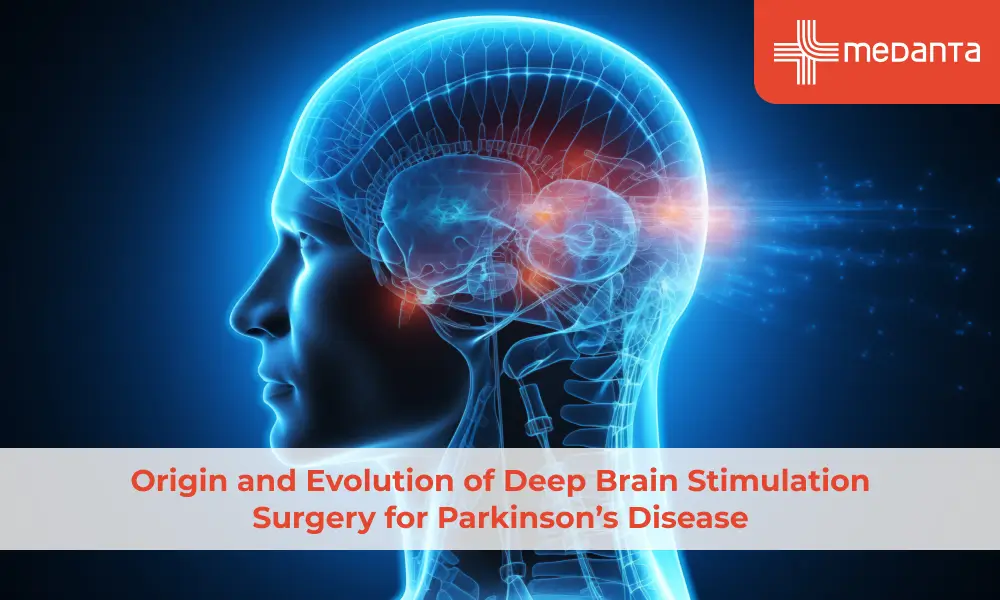Origin and Evolution of Deep Brain Stimulation Surgery for Parkinson’s Disease

TABLE OF CONTENTS
- Understanding Parkinson’s Disease: A Chronic and Debilitating Neurological Condition
- Initial Evaluation by a Movement Disorder Neurologist
- Surgical Treatment Options for Advanced Parkinson’s Disease
- Enhancing Surgical Accuracy with Directional DBS Technology
- Brain-Sensing DBS Systems for Real-Time Feedback and Automatic Adjustments
- North India’s First Directional & Brain-Sensing DBS Implantation
- Conclusion
Understanding Parkinson’s Disease: A Chronic and Debilitating Neurological Condition
Parkinson’s disease is an extremely tenacious, incapacitating and difficult-to-treat chronic degenerative neurological disease. For centuries, it has remained the source of great intrigue among patients and doctors alike, mainly due to its relentlessly progressive nature. Parkinson’s disease is primarily characterised by shaking of the hands and legs, stiffness, slowing of movement, difficulty in walking, reduced facial expressions, softening of the voice, among other symptoms. Contrary to popular belief, this disease is rarely passed on genetically. In majority of the cases, it is sporadic in occurance.
Initial Evaluation by a Movement Disorder Neurologist
A person with any or all of the above symtpoms is to be initially evaluated by a Movement Disorder Neurologist and the diagnosis is mainly clinical. A combination of progressively increasing anti-Parkinsonian medications along with structured neuro-rehabilitation tides over the first few years. However, with progression of the disease, the efficacy of medicines gradually declines, side-effects creep in and the patient’s condition becomes unpredictable. Eventually, the patient tends to become dependent on their caregivers, including for activities of daily living, thus becoming a source of great economic and psycho-social burden.
For such patients, who are suffering from advanced Parkinson’s disease, surgical intervention is advised to improve their quality-of-life as well as significantly reduce the need for anti-Parkinsonian medication.
Surgical Treatment Options for Advanced Parkinson’s Disease
Historically, ablative surgeries targeting specific brain areas were done. However, the concern with this surgical approach, which caused permanent tissue damage, was in its irreversibility and lack of adjustablity to counter the progressive nature of the disease. Thus emerged the need for a reversible and adjustable surgical therapy.
Enhancing Surgical Accuracy with Directional DBS Technology
The essence of a successful brain pacemaker surgery is its precision and accuracy. In this regard, the inculcation of cutting-edge technological advances in the conduction of a DBS stands to logic.
An ingenuous innovation, Directional DBS has emerged as a game-changer. Unlike a conventional DBS surgery, which only allows neuromodulation in one direction, the segmented electrodes (leads) of a Directional DBS system helps in steering the stimulation of the specific region of interest in all three dimensions, thus significantly enhancing the surgical focus and precision while minimizing inadvertent side effects.
Brain-Sensing DBS Systems for Real-Time Feedback and Automatic Adjustments
Another promising technological advancement of DBS is a real-time Brain-Sensing biomarker-guided feedback analysis of the local field potentials by the brain pacemaker pulse generator itself which would then automatically release a closed-loop anticipatory stimulation response, as and when needed, back to the brain so as to alleviate any unpredictable manifestation of Parkinsons’ disease sypmtoms as far as possible. This technology holds the promise of obviating the need of frequent physician-dependent, manual brain pacemaker programming sessions, which are mandatory in case of conventional brain pacemaker surgery.
North India’s First Directional & Brain-Sensing DBS Implantation
Recently, we implanted North India’s first Directional- and Brain Sensing-coupled DBS system in a 70-year-old patient suffering from incapacitating Parkinson’s disease for almost 15 years.
An interesting innovation nowadays being increasingly used in clinical practice of brain pacemaker surgery is patient-specific direct targeting of neural circuits, which is an emerging approach for refractory Parkinson’s disease patients as the next step forward.
Conclusion
Given that the efficacy of DBS surgery probably depends on precise and accurate targeting of involved brain circuits, better surgical planning using information obtained from advanced brain-imaging MRI technologies such as fibre-tracking methods (for example DTI: Diffusion Tensor Imaging), has shown to steadily improve surgical outcomes.
Last year, at Medanta, we also performed India’s first successful robot-assisted awake-neurosugical procedure to implant a brain pacemaker in an intractable Parkinson’s disease patient. Robotic Deep Brain Stimulation (R-DBS) surgery gives the advantage of not only reducing dependence on manual adjustments, but also enhancing overall surgical efficacy.
The application of artificial intelligence (AI) holds great promise in certain salient aspects of brain pacemaker surgery, such as patient selection, surgical targeting and eventual brain pacemaker programming optimization.
Remote-controlled, satellite-aided modulation of brain pacemakers enables doctors to fine tune these devices without the need for patients to travel long distances for follow-up programming sessions. This has proved to be a game-changing innovation as well as it improves overall patient compliance to this therapy.
Eventually, a thoughtful blend of various state-of-the-art technological innovations is necessary towards accomplishing a successful brain pacemaker surgery and consequently improve the quality of life of thousands of patients with severe disability caused by Parkinson’s disease that has become resistant to advanced medications.
In addition, patients suffering from many other advanced disabling diseases such as essential tremor, dystonia, obsessive compulsive disorder (OCD), and intractable adult epilepsy can also be benefitted.






